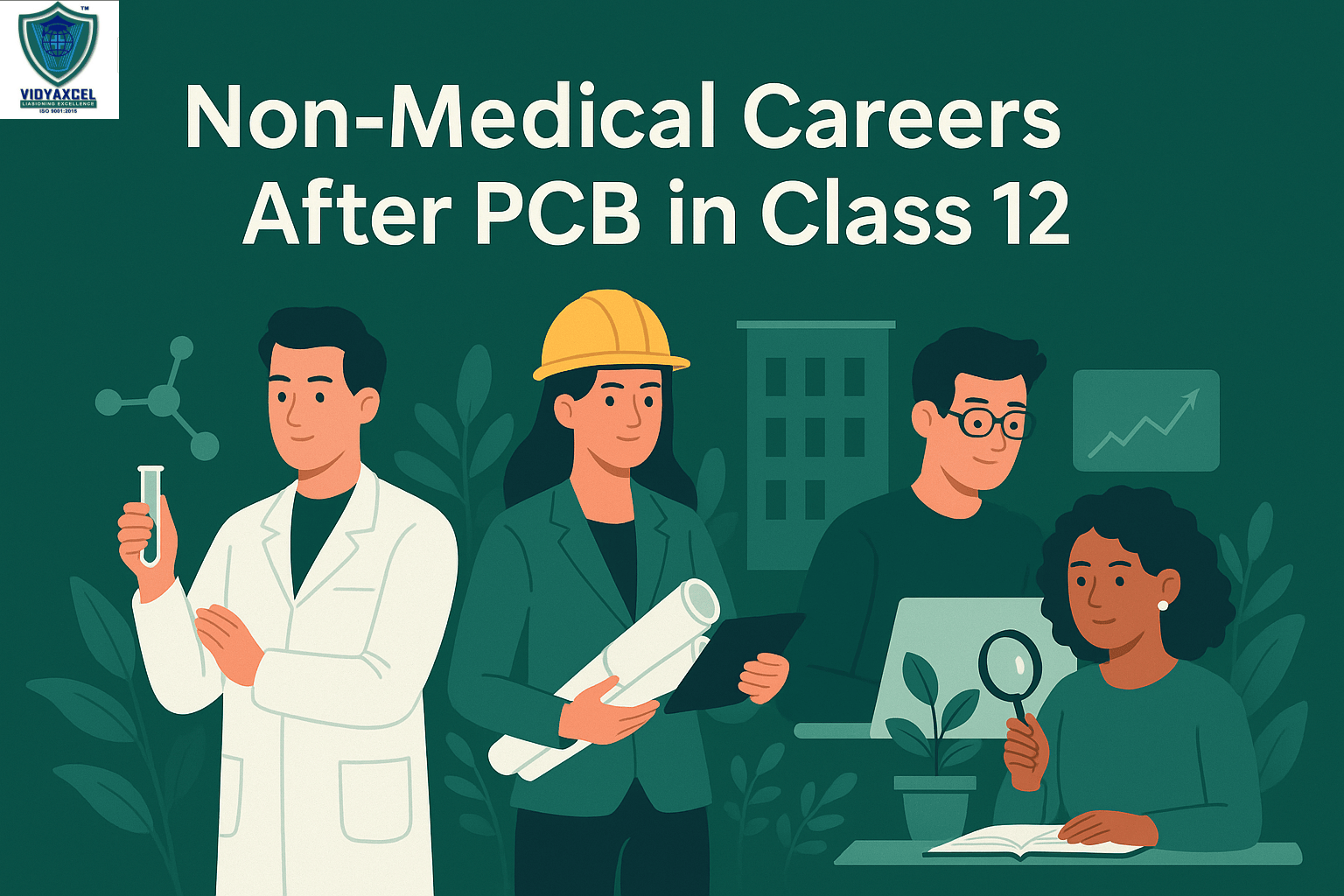Blog Details

31May
Non-Medical Careers After PCB in Class 12
Choosing Physics, Chemistry, and Biology (PCB) in Class 12 is often associated with the pursuit of medicine. However, for many students, becoming a doctor isn’t the only or ideal career goal. The good news is that a PCB background opens doors to numerous non-medical and interdisciplinary careers, many of which are growing in demand, financially rewarding, and intellectually stimulating. This article aims to shatter the narrow mindset that PCB equals MBBS. It provides an in-depth look at various non-medical career paths available to PCB students. From biotechnology to forensic science, environmental studies to psychology, there are abundant opportunities where science meets innovation and impact. We'll explore these options in terms of eligibility, scope, future trends, and institutions offering them.
Whether you're a student unsure about the next step or a parent looking to support your child’s decision, this guide will help you make an informed, pressure-free choice.
Why Explore Non-Medical Careers After PCB?
- Breaking the Stereotype: Medicine is not the only prestigious or impactful career.
- Growing Job Markets: Sectors like biotechnology, environmental science, and healthcare technology are booming.
- Match with Interests: Many students are passionate about science but not interested in clinical roles.
- Balanced Competition: Fewer applicants and better student-to-opportunity ratios.
Key Considerations When Choosing a Career Path
- Passion vs. Pressure: Align your career with personal interests and strengths.
- Academic Preferences: Some fields may rely more on lab work, theory, or field research.
- Time and Cost: Evaluate the duration, fees, and ROI of courses.
- Career Scope: Understand job markets, advancement opportunities, and salary potential.
Top Non-Medical Careers for PCB Students
A breakdown of each field will include:
- What it is
- Skills required
- Courses offered
- Career scope
- Top institutes
- Biotechnology
- Microbiology
- Biochemistry
- Environmental Science
- Forensic Science
- Biomedical Engineering
- Psychology
- Nutrition and Dietetics
- Pharmacy (Pharm, Mepham, Clinical Research)
- Zoology/Botany/Genetics
- Agricultural Science
- Nursing
- Physiotherapy
- Paramedical Sciences
- Occupational Therapy
- Veterinary Science
- Bioinformatics
- Food Technology
- Radiology and Imaging Technology
- Public Health Administration
Career Comparison Table
|
Career Option |
Avg. Salary (India) |
Course Duration |
Required Degree |
Top Colleges (India) |
|
Biotechnology |
₹4–6 LPA |
3–4 years |
B.Sc./B.Tech in Biotech |
Amity, VIT, IITs, JNU |
|
Nutrition & Dietetics |
₹3–5 LPA |
3 years |
B.Sc. in Nutrition |
AIIMS, SNDT Women’s Univ., IGNOU |
|
Biomedical Engineering |
₹5–7 LPA |
4 years |
B. Tech in Biomedical Eng |
IITs, Manipal, SRM |
|
Forensic Science |
₹3–6 LPA |
3 years |
B.Sc. in Forensic Science |
Gujarat Forensic Univ., DU |
|
Environmental Science |
₹4–6 LPA |
3 years |
B.Sc. in Environmental Sci. |
TERI, BHU, University of Pune |
Alternative Interdisciplinary Options
- Science + Law: Intellectual Property Rights, Environmental Law
- Science + Management: Healthcare Management, Hospital Administration
- Science + Media: Medical Writing, Science Communication
- Science + Technology: AI in Healthcare, Health Informatics
Study Options in India and Abroad India: Top colleges (AIIMS, DU, JNU, BHU), exams like CUET, NEET (for a few courses)
- Abroad: USA, UK, Australia, Canada for Biomedical, Biotech, Public Health, Psychology
- Scholarships: DAAD (Germany), Fulbright (USA), Commonwealth (UK), Indian Gov. Schemes
- Curriculum Differences: More research orientation and practical exposure abroad
Tips for Students and Parents Encourage Exploration: Don't limit choices to “safe” careers
- Use Career Counselling: Helps identify aptitude and interests
- Build Skills Early: Communication, research, digital tools, and writing
- Support, Don’t Pressure: Respect your child’s decision-making
Conclusion
Gone are the days when MBBS was the only goal for PCB students. Today’s world offers a broad horizon for students to apply their science background in dynamic ways. The key lies in identifying one’s strengths, passions, and long-term goals.
This guide has shown how diverse and rewarding non-medical careers can be—from biotechnology to law, psychology to public health. With the right approach, students can build successful futures without ever stepping into a medical college.
Parents and educators must support this shift by fostering open-mindedness, research, and guidance. When students are empowered to choose passion over pressure, they thrive.
FAQs
- Can I have a successful career without doing MBBS after PCB?
Yes, fields like biotechnology, psychology, and biomedical engineering offer lucrative and impactful careers. - Are non-medical PCB careers as respected and financially stable?
Absolutely. Many non-medical roles offer high earning potential and strong career growth. - What is some quick job-oriented courses after PCB?
Paramedical sciences, nutrition, radiology, and lab technology are short-term and in-demand. - Can I switch to non-science fields like arts or commerce?
Yes. You can shift with interest and may need bridge or foundation courses in some cases. - What are the best foreign universities for PCB-related courses?
Harvard (USA), Oxford (UK), McGill (Canada), and Monash (Australia) are top options.
Our Office: West Bengal, Maharashtra & Delhi.
For More Infomation about admission in Medical, Engineering, Management & Study in Overseas Details.
View Current Study Overseas, Medical, Engineering & Management Admission Details Video.





